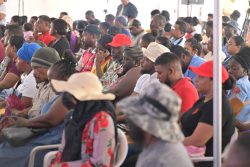Have the arrests of Christopher Raffel Douglas, Shaheed ‘Roger’ Khan and Peter Morgan – all in Trinidad and Tobago – made any impression on Guyana’s political administration, intelligence services and law enforcement agencies?
The president and his cabinet seemed to have been dumbfounded and wrongfooted by the reverses of this country’s citizens in a friendly foreign state. They should not be astonished.
President Bharrat Jagdeo disclosed that, nearly four years ago, he had personally written to USA Assistant Secretary of State for the Western Hemisphere Roger Noriega requesting a USA-Guyana bilateral agreement to share information on drug-trafficking and money laundering. He received no reply. But this should not have come as a surprise.
To start with, this administration dawdled on the establishment of a US Drug Enforcement Administration bureau in Georgetown. The USA also, in an earlier International Narcotics Control Strategy Report pointedly declared that joint US-Guyana operations in combatting narcotics were ‘quickly compromised due to corruption.’ The US Department of State’s decisions from time to time to suspend the visas of high-ranking cabinet ministers and law enforcement officers, also, undermined the fiduciary foundation of security cooperation between the two countries.
Further, the Guyana administration’s hamfisted handling of extradition requests always seems to go uncannily awry. When the US authorities unsealed indictments against four Guyanese nationals and approached the administration for assistance in apprehending them, the suspects were mysteriously tipped off and fled the jurisdiction. As a result, US authorities never disclosed the identities of other wanted men to Guyanese authorities for fear of a recurrence.
Chairman of the Central Intelligence Committee and Cabinet Secretary Dr Roger Luncheon in mid-March admitted that he had ‘no idea’ that Peter Morgan was on the US wanted list. Dr Luncheon claimed that the administration had no access to such information which was provided by the USA only on a ‘need-to-know’ basis. Similarly, Dr Luncheon explained, while Guyana was part of the single domestic security space created for the ICC cricket world cup competition, information about the database of wanted persons was not shared with the Guyana administration.
Minister of Home Affairs Clement Rohee, also, seems to know little of these matters. Under the CARICOM Advanced Passenger Information System, the names of suspects are stored in a fusion centre in Barbados. But, despite Mr Rohee’s responsibility for national security, he has been left out of the loop of security information and could not say whether any Guyanese was on that list.
Minister of Legal Affairs Doodnauth Singh, like his cabinet colleagues, seemed not to know much about narco-trafficking. He admitted that Peter Morgan was likely to have been one of the 14 Guyanese citizens the US authorities wanted to extradite years ago on narco-trafficking charges.
Minister of Foreign Affairs Rudy Insanally has not said much either. It was he who represented President Jagdeo at the 27th CARICOM Heads of Government conference in St Kitts-Nevis, committing this country to a raft of security agreements. These included: Agreement Establishing the CARICOM Implementation Agency for Crime and Security; Memorandum of Understanding for the Sharing of Intelligence Among Member States of the Caribbean Community; Treaty on Security Assistance among CARICOM Member States; and the Memorandum of Intent Between the Government of the United States of America and Member States of the Caribbean Community on Co-operation Regarding the Development of an Advance Passenger Information System. The implications of these agreements for travelling narco-traffickers should have been anticipated.
The apparent ignorance of the Ministers of Home Affairs and of Legal Affairs, and the silence of the Minister of Foreign Affairs, also confirm fears either that the intelligence services have no useful information on narco-traffickers, that local law enforcement agencies have no intention of pursuing them, or that the political administration has little interest in eradicating the narco-trade.
The present system by which suspected Guyanese narco-traffickers are ambushed as they pass through foreign airports seems to be the only one that works well.







